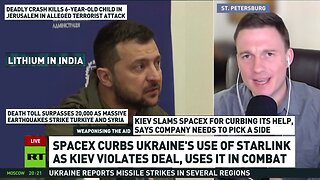RT News - February 18th 2023 LATE
Munich Security conference: Bombastic messages against Moscow continue to emerge from countries who claim they're not directly involved in the Ukraine conflict. Thousands of anti-war protesters rallied outside where those remarks were heard, throughout the day. (QS: Main take-away points below and I will get key issues ready for tomorrow's "The Weekly" post)
The protests come as Germany realises just what a precarious, dangerous place we are in, in time. They have called for all weapons shipments to Ukraine be stopped.
Despite each country saying they are not party to the conflict in Ukraine, the remarks made by "leaders" today indicate the opposite (QS and it's not just those made today either. Rory and Marina Kosareva report - and funnily enough I made a tweet about the defence costs in Britain. I'm shadow banned so nobody will notice it, we paid all that money for "defence and security" Bad value if you ask me. https://twitter.com/DontDenyThe/status/1626990805821886466 ) "Russia is to blame" 😂 )
-
Pulitzer award-winning journalist Seymour Hersh doubles down on his 'investigation findings' into America's role in the Nord Stream pipeline explosions, stating Washington will never admit its guilt. full exclusive interview with Consortium News : https://youtu.be/4wI38E9bJzk
"Even if there is an investigation it will be fake and blame Russia"
-
Ukraine: missile strikes on electrical infrastructure: Explosions have been confirmed in two Ukrainian regions and power outages have been reported across Ukraine.
Donbass: Battle for Artyomovsk: Wagner Group and Russian troops continue to advance and have now comprised the supply routes for Ukraine forces; it also paves the way for a new Russian offensive.
Donbass, Lugansk: Specially trained doctors, used to dealing with the wounds caused by war wounds, shrapnel etc from an airborne unit are treating the wounded amid the conflict in the local hospitals, treating both military and civilian casualties. RT speaks with some of them.
-
Africa: Nigerian authorities call upon Finland to stop an anti-government activist it accuses of inciting unrest in the African country from abroad, ahead of next week's presidential elections.
In Zimbabwe there is a brain drain of medics being tempted to UK for more money. The Zimbabwe government aren't happy with this and say they should be made to pay for the training they have received at home. 4,000 have already left.
Democratic Republic of Congo (DRC) Women have been protesting over violence, sexual violence and murders by the M23 rebels. Millions have been displaced. The situation is getting intolerable for them. They are asking for help from the international community to rid them of the plague of M23. RT speaks to some of the ladies.
African Union: Burkina Faso, Mali and Guinea are seeking reunification with the Union. Each one must divorce with it's current policies in order to re-enter. Bisrat Melesse reports and explains. Attendees of the A.U. summit say closer economic cooperation with AU strengthens Africa, RT speaks to them and they explain to us why.
-
Russia: A digital Rouble ? Russia plans to launch a pilot stage of the Digital Rouble on 1st April with transactions between individuals and payments in trade and services enterprise to begin with. The pilot will cover 13 banks and is built on blockchain technology. Chris Emms explains further and talks about it with Eunan.
-
-
Below, via RT website -- 1) --- NATO doubles down: "Highlights" from the Munich Security Conference (recap)
2) --- Stoltenberg sets condition for Kiev to join NATO
3) --- Russia explains request to shut down Jewish NGO
4) --- Kiev’s security chief gives his take on Soviet Union's collapse
5) --- Kiev is set to receive American Patriot missile batteries. How will this change the battlefield in Ukraine?
6) --- India slams George Soros for meddling
7) --- Google to expand ‘disinformation’ campaign in Europe
8) --- Survivors rescued 12 days after Türkiye earthquake
9) --- Even suspended sanctions cause suffering for Syrian earthquake victims
10) --- More countries join Russia’s SWIFT alternative – Central Bank
-
-
18 Feb, 2023 17:34 RE-CAP Munich Security Conference
1) --- NATO doubles down: Highlights from the Munich Security Conference
Ukraine dominated the annual gathering, with Western leaders pledging to do more to fight Russia
Ahead of the first anniversary of Russia’s military operation in Ukraine, Western leaders, diplomats, officials, and spies are gathered in Munich this weekend to discuss their ongoing efforts to prop up Kiev’s military.
Running from Friday to Sunday, the Munich Security Conference is a global affair, attended by guests from more than 100 countries. However, this year’s conference mostly focused on Ukraine, with President Vladimir Zelensky urging his Western backers to provide more “modern weapons,” and the leaders of the UK, France, and Germany seemingly eager to meet his demands.
1/ Sunak doubles down
-
Speaking at the conference on Friday, British Prime Minister Rishi Sunak called on Western leaders to give Ukraine “advanced, NATO-standard capabilities.” Now is the time to “double down” on military support for Kiev, he added, no matter the cost in “blood and treasure.”
The UK is the largest supplier of military aid to Ukraine after the US, with London committing £2.3 billion ($2.77 billion) to Kiev’s forces last year. In addition to training 20,000 Ukrainian soldiers and pilots this year, Sunak recently announced that the UK would send 14 Challenger 2 main battle tanks to Ukraine, along with the country’s entire stock of AS90 artillery guns.
Russian President Vladimir Putin is “betting we will lose our nerve,” Sunak said, promising that the UK would “prove him wrong” by increasing the supply of artillery ammunition, armored vehicles, and air defense systems. However, reports suggest that the flow of weapons to Ukraine has left British stockpiles depleted.
2/ Germany takes the lead on tanks
-
German Chancellor Olaf Scholz called on allies to send Ukraine Leopard 2 main battle tanks from their own stockpiles. Berlin has been “intensively campaigning” for this since it gave operators of the Leopards permission to export them to Ukraine last month, he claimed.
Scholz’s position marks a dramatic turnaround, given that his government initially refused to authorize delivery of the tanks. Berlin relented in the face of a pressure campaign from its allies, but these allies have since tempered their enthusiasm. Denmark, Greece, Switzerland, and Turkey have outright refused to donate their Leopards, and Finland – which led the “free the Leopards” campaign to pressure Germany – only promised to train Ukrainian soldiers on the tanks.
Canada, Norway, Portugal, and Poland are among the few other states that have agreed to supply Leopards, though German Defense Minister Boris Pistorius acknowledged this week that they had only assembled “half a battalion” so far.
3/ Macron balks at ‘regime change’
-
French President Emmanuel Macron declared on Friday that Paris does not seek “regime change” in Moscow, a position not shared by his allies in Kiev.
“When I hear a lot of people advocating for regime change, I would just ask them: for which change? Who’s next? We experienced several times in the past decade a lot of regime change in a lot of countries. It’s a total failure,” Macron said.
Macron has maintained contact with Putin since the military operation in Ukraine began, and has cautioned the West against trying to force “humiliating” peace terms on Russia. However, he has continued to provide Kiev’s forces with progressively heavier weapons, including infantry fighting vehicles and artillery guns.
4/ Stoltenberg offers hope of NATO membership
-
Ukraine can join NATO, but only if it “prevails as a sovereign, independent state,” Secretary General Jens Stoltenberg stated on Saturday.
This condition is in line with NATO’s membership rules, and with the bloc’s 2008 declaration that Ukraine and Georgia would become members at an undetermined point in the future.
In the meantime, Stoltenberg pledged to continue funneling military aid to Kiev, arguing that while this support “risks triggering escalation,” the “biggest risk of all is if Putin wins.”
Russia has repeatedly warned that Western military aid to Ukraine will only prolong the conflict without changing its outcome. In a social media post on Saturday, former Russian President Dmitry Medvedev wrote that Stoltenberg’s statement shows his “hate and fear,” as well as his willingness to risk “a third world war.”
5/ Blinken and Beijing go head-to-head
-
US Secretary of State Antony Blinken and Vice President Kamala Harris are expected to meet Chinese Foreign Minister Wang Yi this weekend. The meeting will be the first face-to-face encounter since the US shot down an alleged “Chinese surveillance balloon” earlier this month.
China insisted that the craft was a “civilian airship” and condemned Washington for “overreacting” by sanctioning six Chinese companies. Beijing also accused the US of sending its own surveillance balloons into Chinese airspace.
The meeting also comes at a time of increased tension between the rival superpowers, with the US reportedly sending a top military official to Taiwan on Friday.
https://www.rt.com/news/571709-munich-security-conference-highlights/
==============================================
18 Feb, 2023 14:02
2) --- Stoltenberg sets condition for Kiev to join NATO
Only a “sovereign and independent” Ukraine can be a member of the US-led bloc, the secretary general said
Ukraine must “prevail as a sovereign, independent state” before it can formally join NATO, Secretary General Jens Stoltenberg said on Saturday, despite Kiev already considering itself a de-facto member of the Western bloc.
“NATO’s position on membership for Ukraine is unchanged,” Stoltenberg told a panel at the Munich Security Conference. “We agreed back in 2008 that Ukraine will become a member of the alliance and that is still our position.”
“Of course, what matters now is to ensure that Ukraine prevails as a sovereign, independent state. Because without having Ukraine as a sovereign and independent state, there is no way to discuss any kind of relationship between NATO and Ukraine in the future,” he continued, adding that this discussion would take place when the current conflict in Ukraine is resolved.
NATO has long insisted that all prospective members peacefully resolve outstanding international, territorial, or ethnic disputes before joining the alliance.
Ukrainian troops are currently being trained in multiple NATO countries, and the bloc’s members provide Kiev with weapons and intelligence. Earlier this month, Stoltenberg told reporters that NATO countries had already transferred around $120 billion worth of military and financial aid to Ukraine, and the secretary general pledged on Saturday that this support will continue indefinitely, even at the risk of “triggering escalation.”
While formal membership so far remains out of reach for Kiev, Ukrainian Defense Minister Aleksey Reznikov told the BBC last month that his country has already become a “de facto” NATO member, and will “in the near future, become a member of NATO, de jure.”
The accession of Ukraine to NATO would potentially leave more Russian territory within striking distance of the bloc’s medium-range missiles, and is therefore considered an unacceptable national security threat by the Kremlin. Any future Russia-Ukraine conflict would also drag the rest of the alliance into open war with Moscow.
The “demilitarization” of Ukraine and its establishment as a neutral country are two goals cited by Russia for its military operation, launched almost a year ago.
https://www.rt.com/news/571702-stoltenberg-ukraine-join-nato/
==============================================
18 Feb, 2023 14:49 (more important than this sounds....)
3) --- Russia explains request to shut down Jewish NGO
The organization has been mishandling the private data of citizens, the Justice Ministry says
A Moscow court has begun processing a request by the Russian Justice Ministry to close down the Jewish Agency for Israel nonprofit organization, also known as Sokhnut, it was announced on Saturday.
A hearing was initially scheduled for August of last year but was postponed at the request of the defense, which argued that Sokhnut needed time to correct violations pointed out by the Russian authorities.
The Jewish agency’s lawyers had asked for a second delay, although the judge refused the request and has now heard the positions of both parties.
Representatives of the Justice Ministry stated that Sokhnut, which helps facilitate the repatriation of Jews to Israel, had been collecting the personal data of Russian citizens and placing it on foreign websites, which is banned by Russian law.
The NGO committed 16 such violations between April 2019 and March 2022, and was issued with fines totaling 735,000 rubles ($9,900) as a result.
The Justice Ministry considers those breaches to be “systematic” and sufficient enough to seek the shutdown of the organization, representatives explained. They added that the ministry has other complaints about Sokhnut’s operations.
Lawyers for the NGO argued that a shutdown was an excessively harsh measure, considering the violations. They also said that each breach should be considered separately by the court as it would allow the ministry to indicate “mistakes.”
The presiding judge has ordered a break in the case, with the two sides returning to the courtroom on Tuesday.
Late last year, Sokhnut announced that a record 70,000 foreign Jews had immigrated to Israel in 2022. The NGO credited its work to encourage Russians and Ukrainians to repatriate amid the conflict between their nations as leading to such a high figure.
The number of Russians making the so-called ‘Aliyah’ last year was 37,364, exceeding the total figure of immigrants for 2021 by almost 9,000, according to the organization’s data.
https://www.rt.com/news/571703-jewish-agency-sokhnut-court/
==============================================
16 Feb, 2023 19:56
4) --- Kiev’s security chief gives his take on Soviet Union's collapse
Ukrainians were behind the fall of the USSR, Aleksey Danilov claims, threatening that his country can now do the same to Russia
The collapse of the USSR in the early 1990s was the achievement of a handful of Ukrainians, the secretary for Kiev’s National Security and Defense Council, Aleksey Danilov, said on Thursday.
Speaking on air during a local telemarathon, Danilov declared he could “confidently say that it was we, the Ukrainians, who destroyed the Soviet Union.” According to him, of the 176 miners that participated in the first strike in the USSR in 1989, 94 were Ukrainians. Danilov noted that these strikes were the catalyst that caused the eventual collapse of the Union in December 1991.
The security official went on to claim that Kiev today was also capable of “destroying Russia as a state” and warned that, by the summer, the situation on the battlefield between Moscow and Kiev would be a “different picture.”
This isn’t the first time Danilov has issued such threats. Last December, he also called for the destruction of Russia and exclusion of any peaceful negotiations with Moscow. “They must simply be destroyed so that they, as a country, no longer exist within the borders in which they now exist,” Danilov said at a Kiev Security Forum. He also called Russians “barbarians” and stated it was “unbefitting” of the Ukrainian people to negotiate with them.
That same month, Danilov also warned that there would be “blasts” across Russia so long as Moscow continued to stick to its policies and refused to withdraw from territories Kiev claims as its own. In October, he also called for the eradication of the Russian language from Ukraine and urged to make English mandatory.
Russian President Vladimir Putin, meanwhile, has previously emphasized that the West tried to create an enclave in Ukraine meant to cause the collapse of Russia and disintegrate it into a number of petty states.
During a televised address in September, the president also stressed that the West had already openly taken credit for breaking up the Soviet Union, and that it now wanted to do the same by fostering hatred towards Russia in neighboring territories. Putin noted that this was one of the reasons Moscow ultimately decided to launch its military operation in Ukraine in late February of last year.
https://www.rt.com/russia/571602-ukrainians-caused-ussr-collapse/
===============================================
17 Jan, 2023 21:05
5) --- Kiev is set to receive American Patriot missile batteries. How will this change the battlefield in Ukraine?
The complex systems will become a high-priority target for Russia, as the West ups the ante on supplies
This month, the Ukrainian military is set to start training to use the US-built Patriot missile system. Laura Cooper, the deputy assistant secretary of defense for Russia, Ukraine, and Eurasia, has said the process will take “several months.” This means that the technology may soon take a full part in combat operations between Moscow and Kiev. But will the high value equipment tip the balance of power on the battlefield?
A short wait
Discussions around the supply of Patriot surface-to-air missile (SAM) systems to Kiev intensified after major strikes on the energy infrastructure of Ukraine by the Russian Armed Forces and subsequent blackouts. An incident in the Polish city of Przewodow, when a missile from a Ukrainian S-300 air defense system resulted in the death of two farmers, also played a part in the discussions. The chairman of the ruling Law and Justice party, Jaroslaw Kaczynski, suggested that Germany should send its Patriot anti-aircraft missile systems to Ukraine, not Poland.
At the time, Berlin noted that it would prefer the missile defense systems to remain on NATO territory. Yet in less than two months, things changed. At the beginning of January, the United States and Germany agreed to send a Patriot anti-aircraft missile battery to Ukraine. The announcement was made in a joint statement by U.S. President Joe Biden and German Chancellor Olaf Scholz after their first phone conversation in 2023. The training will be conducted both Washington and Berlin. The transfer of the battery is scheduled for the first quarter of the year.
This will be Kiev’s second Patriot battery. As was announced at the end of December 2022, the first will be handed over to Ukraine by the US. It was included in the latest military aid package, totaling $1.8 billion.
Experts from the Center for Strategic and International Studies note that, so far, the Patriot has been the most expensive weapons system provided to Ukraine by the US. They estimate that the total cost of one Patriot system can reach a billion dollars: $400 million for the equipment and $690 million for the missiles.
Ukraine will become the nineteenth country in the world that uses or plans to use this kit. The first Patriot systems were deployed by the US Army back in the 1980s. They were first used in combat during the Gulf War in 1991, and then during the illegal Anglo-American invasion of Iraq in 2003. The Patriot system has undergone significant changes since then: its latest modification includes more accurate and high-performance radars and advanced surface-to-air interceptor missiles – PAC-3 (Patriot Advanced Capability).
It is still unclear which version of the Patriot system Ukraine will receive. But we’re probably talking about the PAC-3.
When is the Patriot system coming to Ukraine?
In wartime conditions, training Ukrainian Armed Forces specialists to use the Patriot system isn’t likely to take a long time. Moreover, Ukraine has much expertise in using the S-300 surface-to-air missile system – one that structurally resembles Patriot.
The procedure for acquiring new missile technology is virtually the same in the Anti-Aircraft Missile Troops of Russia and Ukraine. First, the army personnel are retrained at a specially equipped center. Then the weapons, military equipment, spare parts, and tools are accepted by the anti-aircraft missile batteries (or divisions).
The next stage comprises of the first live firing of anti-aircraft guided missiles (under the current circumstances, this will possibly be carried out from places of permanent deployment under the supervision of U.S. instructors). Then, the anti-aircraft missile system is folded, prepared for transport, and sent to a loading station, such as an airfield or port.
At the final point, divisions and units that have received the new equipment travel to the place of deployment and upcoming combat operations by air, sea, rail, or on foot.
Considering the time needed for preparation, we can expect the Patriot systems in Ukraine to be ready for combat in March.
What will happen after the Patriot is transferred to the Ukrainian Armed Forces?
The Patriot missile system (especially PAC-3) is, without any exaggeration, a state-of-the-art product of the US military industrial complex. Presumably, if the White House decided to send such advanced missile defense weapons to Ukraine, the issue of supplying Kiev with Western-type battle tanks like the German Leopard 2 won’t take long to resolve.
Along with the second Patriot battery, Berlin will also send 40 Marder infantry fighting vehicles to Ukraine, as reported by German Federal Government spokesperson Steffen Hebestreit. This is another big step towards equipping the Ukrainian Armed Forces with Western weapons.
It’s worth noting that after receiving Patriot missile systems and heavy armored vehicles, the Ukrainian Armed Forces will be just a step away from getting F-15 and F-16 fighter jets.
The Patriot batteries are invaluable for Kiev. These systems have, as military specialists say, the potential for non-strategic missile defense. This capability will be particularly useful for the Armed Forces of Ukraine. It’s an effective means of combating manned aviation, sea-based and air-based cruise missiles, tactical ballistic missiles, and operational-tactical ballistic missiles.
Most probably, the systems will be deployed to shield the Ukrainian capital, Kiev, and to defend this decision-making center from the attacks of various types of cruise missiles. However, it will take dozens of Patriot batteries to cover all the administrative and political centers of Ukraine, including regional cities and key energy facilities. And Ukraine is unlikely to receive that many MIM-104 Patriot systems in the foreseeable future.
The Patriot’s “Achilles' heel”
Presently, the key concern is the number of anti-aircraft guided missiles that will be supplied along with the Patriot system, since the number of missiles used during the repulse of massive air attacks by the Russian Armed Forces exceeded all expectations. If Ukraine does not receive enough missiles, its two Patriot batteries will simply stand idle.
The Patriot missile defense system also has its weak spots or rather, its particular features. For example, the Patriot AN/MPQ-53 multifunctional radar has rather low search capabilities. This feature is native not only to the Patriot system, but also to the target illumination and missile guidance radar and the multifunctional radar of the Russian S-300/400 missile defense system.
In Russian systems, this shortcoming is compensated for by providing the S-300 and S-400 anti-aircraft missile divisions with either 5N66M-type low-altitude detectors, or 96L6E-type high-altitude detectors. Moreover, anti-aircraft missile divisions receive searchless target designation from system command posts equipped with a detection radar (RLO 64N6, S-300) or a radar complex (RLK 91N6E, S-400).
As a result, if it’s deployed near Kiev, the Patriot missile battery will have to be provided with additional search and targeting capabilities. Obtaining data from the Boeing E-3 Sentry, an option mentioned by some experts, is not particularly useful since it means that a certain number of E-3 aircraft will have to relocate to Ukrainian airfields.
It is unlikely that the US and its allies will agree to this. But in some way, the Ukrainian military will have to solve the system’s issues. And that may really be a problem.
How will Russia fight the “Patriots?”
The capture of a Patriot air defense system is a highly unlikely scenario. The system is not a front-line weapon. It will probably be placed in the rear of the Ukrainian Army, covering Kiev or Right-bank Ukraine. It would require an offensive operation to capture the Patriot system, and even so, success is far from guaranteed. Not a single M142 HIMARS combat vehicle has yet fallen into Russian hands. Meanwhile, a detailed examination of the system is only possible following its capture and disassembly.
The Patriot air defense systems delivered to Ukraine will become a high-priority target for the Russian Armed Forces, but the task is hardly simple. The Patriot is a highly mobile system (it takes no more than 25 minutes to deploy/fold). This means the system does not remain in the same position for long. After several missile launches, it can relocate. And finding the Patriot won’t be easy.
After February 24, the Armed Forces of Ukraine kept several divisions of the S-300PT air defense system in service. The “PT” abbreviation means that it’s a container-type system (by the way, the weight of some containers, such as F9, exceeds 16 tons). It takes several hours to fold /deploy this modification of the S-300. Yet despite its low mobility, the container-type system is still used in the Ukrainian army. Surely, a highly mobile anti-aircraft missile system has a much higher chance of survival.
As for the Patriot missile defense system, Russian troops may use anti-radar missiles of the X-31P type, guided air-to-surface missiles such as X-29T, X-38Mxx, X-59MK, etc., and free-fall bombs (OFAB-250-270 and FAB-500-type) to target and destroy it. One way or another, it will be up to the Russian army to solve the issue.
By Mikhail Khodaryonok, military observer, retired colonel, and air defense specialist
-
https://www.rt.com/news/569797-kiev-will-receive-two-patriot/
============================================
18 Feb, 2023 14:03
6) --- India slams George Soros for meddling
The Foreign Minister says the billionaire activist is "old, rich, opinionated and dangerous"
India’s Foreign Minister Subrahmanyam Jaishankar and other officials have blasted billionaire George Soros for suggesting that the scandal around the Adani Group, linked to Prime Minister Narendra Modi, might bring a "democratic revival" for the country.
Soros said during the Munich Security Conference on Thursday that fraud allegations against the multinational conglomerate, headed by the PM’s long-time associate Gautam Adani, would "significantly weaken Modi’s stranglehold on India’s federal government... I may be naive, but I expect a democratic revival in India."
Those comments didn’t go unnoticed in New Delhi, with Jaishankar firing back on Saturday at the 92-year-old billionaire and neo-liberal political activist. The foreign minister described Soros as "old, rich, opinionated and dangerous" because he’s willing to invest his money in "shaping narratives."
"People like him think an election is good if the person they want to see wins and, if the election throws up a different outcome, then they will say it is a flawed democracy," he added.
Jaishankar also recalled that Soros, who runs the Open Society Foundation and sponsors numerous NGOs around the globe, hasn’t always been correct in his forecasts. "Few years ago, he actually accused us of planning to strip millions of Muslims of their citizenship, which of course didn't happen. It was a ridiculous suggestion," the minister said.
The head of India’s Ministry for Women and Child Development, Smriti Irani, commented that the recent statement by the Hungarian-American investor was "not just an attempt to hurt India’s image; if you listen to him carefully, he talks of regime change."
"India has always defeated foreign powers whenever it has been challenged and will continue to defeat them in the future, too," Irani told the journalists at the headquarters of the ruling Bharatiya Janata Party (BJP).
The country’s second-largest party, the Indian National Congress (INC), has also rejected attempts by Soros, who has often been called a "champion of globalism," to meddle in India’s internal affairs.
"Whether the 'PM-linked Adani scam' sparks a democratic revival in India depends entirely on the Congress, Opposition parties and our electoral process. It has nothing to do with George Soros," INC general secretary Jairam Ramesh wrote on Twitter.
https://www.rt.com/news/571699-soros-india-modi-adani/
===========================================
13 Feb, 2023 20:49
7) --- Google to expand ‘disinformation’ campaign in Europe
After suppressing anti-Ukrainian content in Poland, the tech giant will now target Germany
Google is expanding its campaign against what it calls online “disinformation,” and will roll out ads in Germany aimed at “prebunking” content it disagrees with. Tested in Poland last year, the ads are the product of a Google research unit formed to combat “threats to open societies.”
The tech giant will release a series of videos identifying apparent misinformation techniques and release them on multiple platforms in Germany, including Facebook, YouTube, and TikTok, the Associated Press reported on Monday. The ads will focus on photos and videos, and the ease with which both can be manipulated, the news agency noted.
The concept of fighting the techniques behind alleged disinformation rather than the information itself is called “prebunking,” and was developed by researchers at the University of Cambridge and Jigsaw, Google’s in-house “internet safety” unit. Borrowing language from the medical field, these researchers claim that short videos “inoculate” the public against “misinformation.”
It is unclear what kind of “disinformation” Google’s effort in Germany will focus on.
Jigsaw describes itself as countering “threats to open societies,” a term most commonly associated with liberal financier George Soros’ ‘Open Society Foundations’. Jigsaw is similarly liberal and internationalist in its outlook. Its first CEO, Jared Cohen, was an aide to Hillary Clinton at the US State Department, and a proponent of using technology to advance US interests abroad, including by engaging in regime change operations.
Jigsaw rolled out its ‘prebunking’ ads in Poland, the Czech Republic, and Slovakia last fall, where it focused specifically on making viewers more accepting of Ukrainian refugees. Google found that the Polish campaign worked, and that those who saw the videos were less likely to spread “false claims” to others, the Associated Press wrote.
“There’s a real appetite for solutions,” said Beth Goldberg, head of research and development at Jigsaw. “Using ads as a vehicle to counter a disinformation technique is pretty novel. And we’re excited about the results.”
In the US, a recent report by The Intercept found that the Department of Homeland Security partners with multiple tech firms – including Twitter, Facebook, Reddit, Discord, Wikipedia, Microsoft and LinkedIn – to target “inaccurate information” on topics including “the origins of the [Covid]-19 pandemic and the efficacy of [Covid]-19 vaccines, racial justice, US withdrawal from Afghanistan, and the nature of US support to Ukraine.”
Files released by Twitter CEO Elon Musk last month revealed that under previous management, the platform censored “legitimate information” on behalf of the White House and numerous US intelligence agencies.
https://www.rt.com/news/571433-google-disinformation-prebunking-germany/
============================================
18 Feb, 2023 16:08
8) --- Survivors rescued 12 days after Türkiye earthquake
More than 46,000 people confirmed dead in the aftermath of the earthquakes which struck Türkiye and Syria
Three survivors, one of whom was a child, were successfully rescued from the rubble of a building in Türkiye’s Hatay province on Saturday, according to the Anadolu news agency.
However, a reporter from the Turkish television channel NTV said that one of the three –understood to be a child– had later died in hospital, nearly 300 hours after the back-to-back earthquakes rocked Türkiye and neighboring Syria.
“We heard shouts when we were digging today an hour ago,” Atay Osmanov, a member of the rescue team, told Reuters. “When we find people who are alive we are always happy.”
Reports from the scene showed how rescue workers requested complete silence as they surveyed rubble where survivors are thought to be, using electronic sound detectors. One worker was heard asking survivors to, “Take a deep breath if you can hear my voice.”
Rescue teams are continuing to search for survivors following the February 6 natural disaster, a mammoth task made more difficult by the passage of time, and with more than 264,000 residential apartments estimated to have been destroyed.
Türkiye has so far reported the deaths of 40,642 people as of Saturday, while Syria has confirmed more than 5,800. Both figures are expected to rise and, in Syria’s case, sharply. Neither country has offered an estimate of how many people remain unaccounted for.
Within Türkiye, anger is growing at alleged malpractice in the development of residential buildings – such as the supposedly “earthquake-proof” Ronesans Residence in Antakya, in the south of the country, which collapsed during the earthquake, killing hundreds, including former Chelsea footballer Christian Atsu.
Türkiye has pledged to investigate any such allegations, and authorities last Friday arrested the developer of Ronesans Residence, Mehmet Yasar Coskun, as he attempted to board a flight to Montenegro, according to the Anadolu news agency.
https://www.rt.com/news/571711-survivors-rescued-turkey-quake/
=============================================
18 Feb, 2023 14:49 ---- OP ED ----
9) --- Even suspended sanctions cause suffering for Syrian earthquake victims
After years of a US-led economic blockade, a short humanitarian break is not enough -OP-ED- Robert Inlakesh
The effects of the devastating 7.8 magnitude earthquake which hit both Türkiye and Syria earlier this month, are being compounded by US sanctions. But despite a temporary relaxation of restrictions on the war-torn and shaken country, problems still exist.
Syrian provinces have still been left ill-prepared to deal with the scale of disaster that has befallen them and must now be given every support to reconstruct their country. According to authorities in Turkey and Syria, as many as 42,000 people have been killed by the devastating quakes, with at least 23 million people affected in total. Millions have been temporarily displaced, and many more still await news on their loved ones and whether or not they survived. The situation as it stands is an utter disaster, and the full impact is impossible to convey in mere words.
In Türkiye’s case, the international community’s response was unanimous; aid was pledged, teams arrived to relieve the suffering and, whatever the political frictions between Istanbul and some Western nations, a sense of universal humanitarian comradery prevailed. The Biden administration in Washington reacted to the natural disaster by pledging “anything” that Ankara needed, while the European Union mobilized emergency response and offered its Copernicus satellite mapping service to help first responders in Türkiye.
However, the situation has been very different for Syria with only a few select nations quick to come to its aid. The US government stated that it would not cooperate with Damascus to deal with the carnage inside Syrian territory. The Syrian government officially requested help from the EU, which some EU states instantly refused to provide. The United Kingdom quickly came to the aid of their NATO ally Türkiye, but refused help to the suffering Syrians, and Ukrainian President Vladimir Zelensky tweeted his condolences to Türkiye and its people in Turkish but failed to acknowledge Syria at all. Syrians were not in the spotlight to receive help from the West and are actively being ignored in spite of the gravity of the situation facing them.
Compounding the difficulties is a plethora of sanctions against the Damascus government, which were applied by the EU, the UK and the US. The worst of these are perhaps the 2019 Caesar Act sanctions, which have severely crippled Syria’s post-war economy and robbed the nation of the ability to reconstruct.
The US sanctions have indeed been amended for a short period, to allow relief aid to travel into Syria, but the problem with the sanctions is not just that they hindered aid from entering the country for days.
The dire economic situation across Syria’s provinces, a problem preceding the current crisis, has undermined the medical sector’s capacity to deal with the sheer number of dead and injured following an earthquake of this magnitude. According to a number of UN experts, the sanctions imposed upon Syria were already causing a humanitarian crisis and should be lifted.
“With more than half of the vital infrastructure either completely destroyed or severely damaged, the imposition of unilateral sanctions on key economic sectors, including oil, gas, electricity, trade, construction and engineering have quashed national income, and undermine efforts towards economic recovery and reconstruction,” Alena Douhan, UN Special Rapporteur on unilateral coercive measures and human rights, said last year.
The UN has directly linked Syria’s current cholera epidemic to Western sanctions, which have prevented rehabilitation and development of water distribution networks at a time when 12 million Syrians grapple with food insecurity.
According to on-the-ground accounts, during the first few days following the earthquake, there was not enough fuel to transport aid and rescue teams to affected areas quickly. In Syrian government-held areas, electricity only runs for a few hours per day under normal circumstances. Now, given the masses of displaced families, people are suffering in sub-zero temperatures at night.
Exacerbating the issues is that while Syria is rich in natural gas and oil, the US military, along with its proxy forces in the northeast of the country, occupies a third of Syria’s territory, including its oil and gas fields. The most fertile agricultural lands have also been stolen from the Syrian people by US occupation, which was never granted congressional approval back in Washington. Piling onto that pressure, Israel also used the earthquake as an opportunity to claim that the Syrian government had requested aid from it, knowing this would reflect poorly on Damascus. The Syrian government denies this, and although Israel claims the aid would be directed to Syria, it was only sent to Türkiye.
That the US State Department amended its sanctions is a tacit admission that they had prevented aid reaching Syria and that Washington is cognizant of this fact. Efforts to deny that sanctions impeded foreign nations from sending aid to those suffering, for example in The Washington Post are deceptive and done in poor faith.
According to Aron Lund, a fellow with the New York-based think tank Century International, although the sanctions do not technically forbid aid, the reality on the ground is something completely different. Banks often block transfers that are supposed to pay suppliers or local aid workers for fear of breaking sanctions rules, Lund observed, as quoted by the Associated Press. Additionally, the sanctions actually target reconstruction inside Syria, which means that they will block rebuilding efforts, whether the destruction resulted from the 12-year-long war or from the earthquake.
Out of Syria’s four primary border crossings, for years only the Bab al-Hawa crossing into the Idlib province was given a mandate by the UN for delivering aid to Syria. Idlib is controlled jointly between Turkish forces in the north and al-Qaeda-linked Hayat Tahrir al-Sham, whereas the Syrian government does not have direct territorial access to the crossing and most countries refuse to use the Damascus International Airport to send aid.
On top of this, the sole border crossing was severely damaged by the earthquake, depriving roughly 4 million Syrians of aid they depend on. Recently, Syrian President Bashar Assad offered support to civilians living inside the Idlib province, help that was rejected by Hayat Tahrir al-Sham. The Syrian leader also permitted the opening of two additional crossings into Idlib, a move commended by the UN Secretary General Antonio Guterres.
The story that is unfolding in front of our eyes is one of bitter and selfish Western governments that put their obsession for regional hegemony above humanitarian issues. What happened to Syria and Türkiye should not be politicized and should not result in the deaths of those who are not in any way involved.
The sanctions on Syria have killed innocent civilians, and the inaction of the West in aiding the Syrian people at this time is tantamount to abandoning those who could have been saved. If we now know that the sanctions block aid, why is it acceptable that the US only temporarily freeze them? They should not be in place at all, and neither should US forces occupy Syrian territory.
" .... The statements, views and opinions expressed in this column are solely those of the author and do not necessarily represent those of RT....."
Robert Inlakesh is a political analyst, journalist and documentary filmmaker currently based in London, UK. He has reported from and lived in the Palestinian territories and currently works with Quds News. Director of ‘Steal of the Century: Trump's Palestine-Israel Catastrophe’.
-
https://www.rt.com/news/571653-syria-earthquake-us-led-economic/
============================================
18 Feb, 2023 14:32
10) --- More countries join Russia’s SWIFT alternative – Central Bank
The system now includes 115 foreign entities from 14 nations
Russia’s SPFS interbank messaging system is expanding at an unprecedented pace and now includes 469 participants, according to Alla Bakina, head of the Central Bank’s national payment system department.
“Over the past year, we have connected as many [members] as for the entire period of the system’s operation,” the banking official stated on Friday on the sidelines of a forum in Ekaterinburg. Around 115 of the participants are foreign entities from 14 countries, Bakina added.
She noted that the Russian Central Bank is working to connect even more countries to its SPFS system. “We work with friendly countries; they connect in different formats – both individually and through a service bureau. The list is expanding,” said the official.
An alternative to SWIFT, the SPFS ensures the transfer of financial messages between banks inside and outside of Russia. It was created in late 2014 in response to the first wave of sanctions over Crimea’s reunification with Russia, which targeted a number of Russian banks, among other entities.
Moscow has promoted the use of the SPFS as the West has ramped up sanctions. Russia has also accelerated efforts to move away from the dollar and euro towards settlements in national currencies.
https://www.rt.com/business/571628-russia-swift-alternative-member-countries/
===========================================
-
 30:06
30:06
QueenStreet
1 year agoRT News - February 25th 2023 Late
5.09K6 -
 29:29
29:29
QueenStreet
1 year agoRT News - February 10th 2023 LATE
4.2K3 -
 29:04
29:04
vorrumble
1 year ago2023-01-05 RT News - January 5th 2023
25 -
 1:02:22
1:02:22
Richie Reports UK
4 months agoUK Column News - Friday 16th February 2024.
127 -
 1:00:44
1:00:44
Richie Reports UK
10 months agoUK Column News - Friday 1st September 2023. (Full Edition).
423 -
 1:01:09
1:01:09
Richie Reports UK
2 months agoUK Column News - Friday 12th April 2024.
42 -
 1:05:22
1:05:22
Richie Reports UK
2 months agoUK Column News - Monday 15th April 2024.
60 -
 1:01:07
1:01:07
Richie Reports UK
2 months agoUK Column News - Wednesday 10th April 2024.
81 -
 1:21:45
1:21:45
Foreign Agent Intel
1 year ago $0.04 earnedNews Round Up, August 4th - Inside Russia Report
184 -
 32:12
32:12
Humanity Is Under Attack
1 year agoRT News - February 9 - 2023
2241